A ‘true crime for toddlers’ podcast is part of accelerator to create programs for kids and caregivers
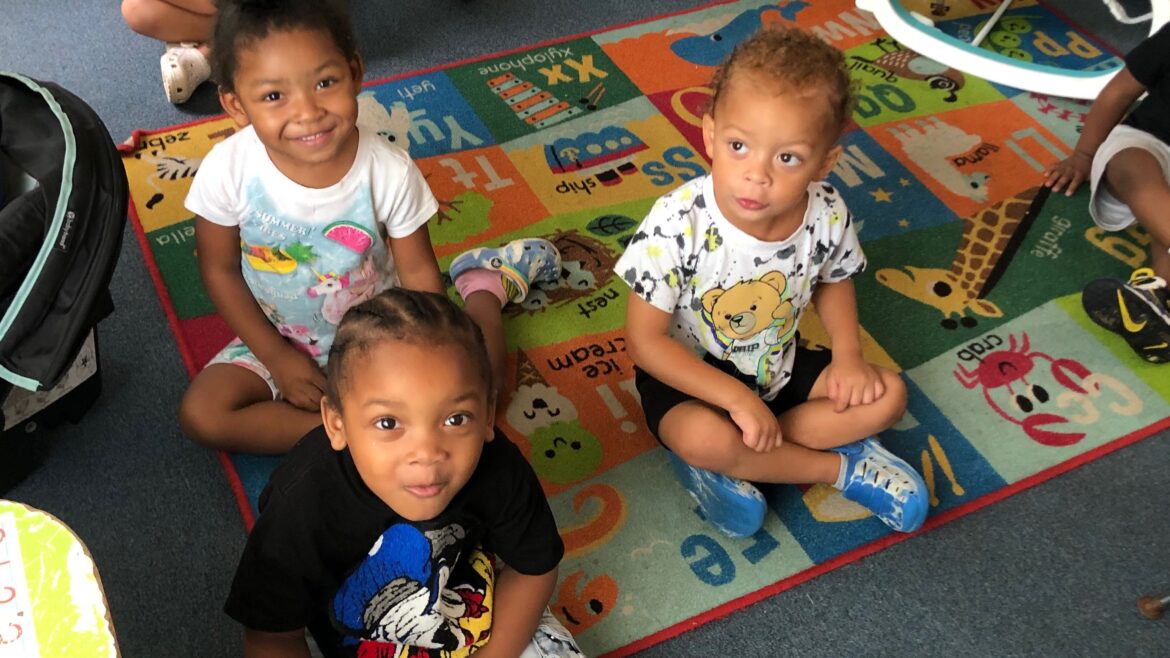
Ball State PBS
Kids at daycare listen to "Daycare Detectives Inc.," a podcast produced by Ball State PBS in Muncie, Ind.
Earlier this year, Ball State PBS in Muncie, Ind., was selected to participate in the second round of an accelerator program that helps public media stations produce podcasts for kids and caregivers. But after developing the idea for its podcast, the station ran into a hiccup almost immediately: PBS North Carolina had pitched a similar concept during the previous year’s accelerator, so the team wanted to pivot.
When Michelle Kinsey, the station’s community engagement and grants manager, revisited her team’s well of ideas, she decided to combine their personal interests in true-crime podcasts with celebrated kids shows like Blues Clues and Scooby-Doo to dream up Daycare Detectives Inc., a program Ball State PBS plans to launch in January. Episodes will roll out every other week until May.
Kinsey and Angie Rapp, director of audience development, and Sarah Kreps, an assistant producer and director, are designing the podcast to be a somewhat silly, fun-loving, problem-solving and educational podcast aimed at children around five years old. A pilot episode they previewed at the National Educational Telecommunications Association Conference in September asked the audience to help solve a mystery involving a child’s missing purple crayon.
Kids’ voices, including joyful “Yeahs!” and “Nos!”, punctuated the episode while Kinsey served as the narrator propelling the story and revealing clues, like “crayon crumbs.” (This reporter won’t spoil the ending, but the NETA audience appeared amused.)
“While we’re focusing on daycares, I feel it’s going to be enjoyable for parents and kids at home, grandparents while they’re watching their grandchildren,” Kinsey told Current. “There’s all sorts of audiences that will have fun with this podcast.”
Daycare Detectives Inc. was developed as part of the CPB-PBS Ready To Learn initiative funded by the U.S. Department of Education. CPB provided $12,000 to each station that participated in the 16-week accelerator, where PRX training leads Mike Russo and Stephanie Kuo helped guide the cohort through the art of podcasting.
Aside from Ball State PBS, East Tennessee PBS in Knoxville, KERA in Dallas and the WNET Group in New York completed the accelerator. KSPS in Spokane, Wash., was scheduled to participate but left before the program began, according to Russo.
The first cohort that went through the accelerator last year included both public media stations and independent producers. The program was reconfigured this year to focus on pubcasters participating in CPB’s Learning Neighborhood project, a RTL offshoot in which stations support children and caregivers in their communities.
Ball State PBS’ Learning Neighborhood includes daycares, churches and other organizations that care for young children. WNET concentrates on the diverse Brownsville neighborhood in Brooklyn, while KERA focuses on the predominantly Latin and Hispanic Bachman Lake neighborhood and East Tennessee PBS works with families affected by the justice system. Each station’s Ready To Learn podcast connects with its Learning Neighborhood project. They spent their accelerator money on equipment and, in some cases, consultants and outside talents who worked on the projects.
‘Daycare Detectives Inc.’ podcast dreams big
Kinsey and Rapp, two thirds of Ball State PBS’ team, had never produced a podcast before Daycare Detectives Inc. Their original idea was a game show where kids would guess what jobs people had. But that was too similar to Work It! Work It!, the working title for the podcast PBS North Carolina pitched for the 2021 accelerator.
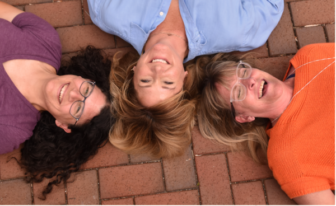
When the Daycare Detectives Inc. team went back to the drawing board, they thought of their Learning Neighborhood and were inspired by Dora Hill, a daycare provider in Muncie who oversees 15 children in her home. When the Ball State PBS team gathered feedback from potential audiences as part of the accelerator program, Hill told them she wanted easy-to-use and free educational resources. Her comment sparked the idea for the mystery podcast.
“Picture Dora: She’s just finished a hands-on science activity with preschoolers and needs to change the diaper of a fussy infant nearby. She gathers the kiddos and with a few clicks she plays an episode of Daycare Detectives Inc. while she takes care of … the dirty work,” Kinsey said at the NETA conference, pausing for the punchline. “She can still engage with the rest of the kids as they listen together while she grabs the extra baby wipes or prepares lunch or just takes a moment to sit down and relax. Our podcast is for the Doras out there.”
The program’s DNA combines the call-and-response format used expertly in Blues Clues and the quirkiness of Scooby-Doo with the widespread appeal of modern true-crime podcasts. With the use of sound clues, interviews with “witnesses” and multiple-choice questions, Kinsey said the podcast also aims to excite children about learning new things. At NETA, Rapp said the station plans to produce episodes about a field trip to a museum and a refugee student from Afghanistan.
“We’ll also build a companion website where detectives can get printables, play games related to the episodes and watch videos about the daycare detectives featured in the podcast,” Rapp said, adding that Ball State PBS also plans to deliver listening kits to listeners, including Bluetooth speakers and magnifying glasses.
Each episode will be about eight to 10 minutes, a sweet spot the producers said engages younger children just before they get restless. The station plans to produce eight episodes for the first season, but Kinsey is already thinking big about the program’s potential to interest audiences beyond daycare centers. She described plans to reach “true-crime parents” by promoting the program on adult podcasts as “true crime … for toddlers!”
“Dream scenario down the road? Listen, I see this as national,” Kinsey said. “I see merchandise. I see participation by not just daycare providers but families, and I see a lot of intergenerational learning all over the country.”
KERA’s focus: jobs and dreams
Micaela Rodríguez, managing producer of podcasts for KERA in Dallas, is leading the Spanish-language podcast ¿Cuál Es Tu Sueño? She’s working with Lisa Bracken, KERA’s director of education, and Connie Vega Brown, a contract scriptwriter.

At the NETA conference, Rodríguez and Bracken previewed an episode of ¿Cuál Es Tu Sueño? The episode opens with the host, a child, talking about a book by former NASA astronaut José M. Hernández, El niño que alcanzó las estrellas or The Boy Who Touched the Stars.
The young host tells listeners about a part of the book that stood out to her — when Hernández was anxious and a bit scared before being cleared for takeoff. The host connects that moment to ways people can practice being calm in tense moments, like doing breathing exercises.
When KERA first applied to the accelerator, Rodríguez said, the team wanted to produce a program titled Juego de Palabras. The zany guessing-game show included elements of magical realism, dancing and music and would help kids “get their energy out,” she said. But after speaking to Bachman Lake residents, KERA pivoted to ¿Cuál Es Tu Sueño?, which has a much calmer aesthetic.
Rodríguez offered an example of why the station switched: One parent told the station that her kids were already energetic, didn’t need more stimulation and could use “a way to unwind.”
“Originally we kept the same name and tried to make it into something calmer … but we started thinking of different themes and vibes that would get away from the fun chaos that we started with,” Rodríguez said.
Similarly, Bracken told NETA attendees that her team spoke with a bilingual elementary school counselor for feedback about the program. The counselor discussed the recent mass shooting in Uvalde, Texas, and said children have a lot of anxiety about the world and need more “Zen.” Conversations with caregivers influenced the station to consider producing YouTube videos, TikToks and Instagram Reels about mindfulness, she said.
KERA plans to produce about eight episodes of the podcast, each one around eight minutes in length. They aim to select a child from their Learning Neighborhood in Bachman Lake to host the show, but a child of a station staffer is filling this role while the station fine-tunes the script for ¿Cuál Es Tu Sueño?
“The thing about having kids read scripts is they don’t always know the inflection you want,” Rodríguez said. Adding notes and other details to the script can help a kid perfect the reading, she said.
WNET podcast blends late-night format with food
WNET’s Ready To Learn podcast, The Plate Show, was inspired by late-night television and food programs. It’s led by Norah Jones, content producer for early learning, and Hannah Dawe, coordinating producer for kid’s media and education.
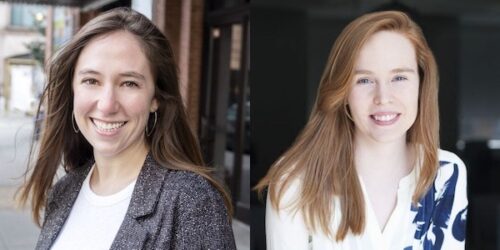
The program features Spoonie, a fictional spoon character, hosting a late-night show that opens with a jokey monologue, then proceeds to a series of guests. The guests will include real children discussing their favorite foods and traditions from their cultures. Talking foods such as a tortilla join to add cultural context.
Each episode ends with a game featuring a celebrity guest from the food industry. Interspersed throughout will be recipes for families to try at home along with fun facts. “Think Wait Wait… Don’t Tell Me! meets Waffles + Mochi meets The Tonight Show,” Dawe said at the NETA conference.
The podcast features professional voice actors. WNET also worked with an outside cultural advisor to help ensure that the foods and characters they plan to showcase are well-researched and properly depicted.
Like other stations in the accelerator, WNET began its project by conducting “empathy interviews” with residents of its Learning Neighborhood to discover what they might like, Dawe said. From those conversations, they learned that community members wanted more ways to discuss different cultures with their children and also see their own cultures celebrated. Some interviewees lived outside of Brownsville, including other states.
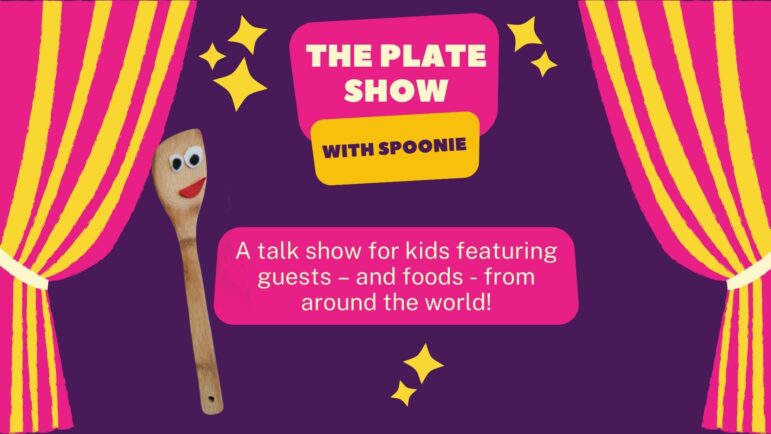
Food came up a lot during those conversations, Jones said, noting that caregivers are looking for ways to overcome the challenge of introducing new foods to kids. One parent said they wanted their child to become more comfortable and excited about foods they haven’t tried when they visit friends’ homes, especially when the hosting family has a different cultural background. When Jones and Dawe heard that, they focused on introducing kids to new cultures and creating a fun educational opportunity.
They didn’t originally think of the late-night show aesthetic but creeped closer to the idea after one kid told them they loved talent shows. That’s when they realized that the podcast could be “more sparkly” and interesting, Dawe said.
WNET completed its pilot and is seeking more feedback from its Learning Neighborhood before determining the number and length of episodes it will produce, though the length will likely be 10 to 15 minutes.
“What I hope is that [The Plate Show] sparks curiosity and inspires delight in this idea of learning about people and cultures you might not be familiar with,” Dawe said.
East Tenn. PBS’ podcast focuses on caregivers
Haley Johnson, a former middle school teacher who is director of education for East Tennessee PBS, is leading the podcast Parenting in Progress alongside producer Joseph Fioravanti. They plan to release about 12 to 15 episodes starting next spring.
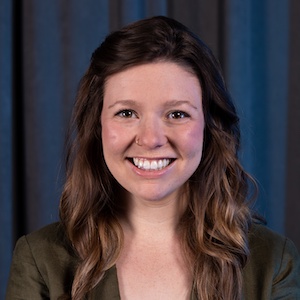
Like Kinsey and Rapp of Ball State PBS, Johnson had never produced a podcast but listens to them regularly. She’s a fan of “chat casts,” which she described as the “long, meandering” podcast format that’s widely popular in the U.S.
In her conversations with community members, Johnson learned that Parenting in Progress episodes should run about 20 minutes “because that’s about as long as it takes to rotate a load of laundry around.”
“We found that something utilitarian was something that our parents and caregivers could use and benefit from. We do view it as a parenting tool,” she said.
Working on the podcast has been eye-opening for Johnson. Early on during the accelerator, after her idea was formed, she found out she was pregnant, which she described as a “welcome surprise” for her family. She found herself thinking more about what caregivers want and settled on the idea of a podcast that features experts discussing a variety of topics without being preachy, judgmental or coming off as handing down “parenting commandments.”
“The goal of the podcast is to take some of the concepts you would learn in a master’s program on child development and …make them accessible to everybody so parents are still the decision-makers for their children,” she said.
Although East Tennessee PBS’ Learning Neighborhood is focused on families affected by the justice system, she wants the podcast to touch on universal challenges affecting parenting. One topic she wants to cover is what she called “caregiver self-regulation,” or instances when a child’s behavior upsets the parent. The caregiver has to be able to calm themselves when they may be affected by lack of sleep, poor nutrition and stress at work. Another topic could be metacognition, or how reflecting on one’s thoughts can help parents.
“So much of parenting is people telling you what to do. That is not the goal of the podcast. My kid is not even out of my body yet, and everybody wants to tell me what to do most of the time,” she said. “It’s not ‘Parent this way to parent well.’ What we really want to do is just illuminate things for parents.”





